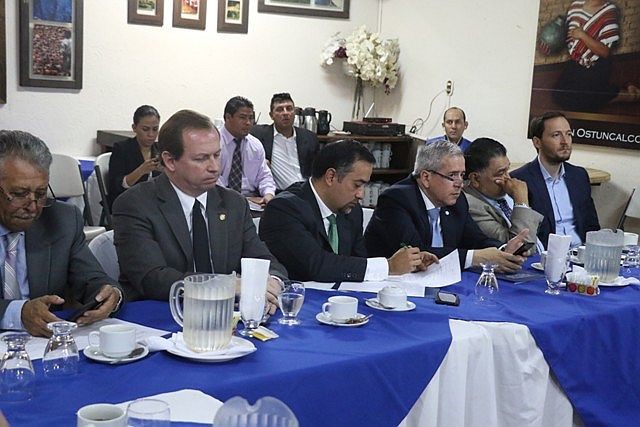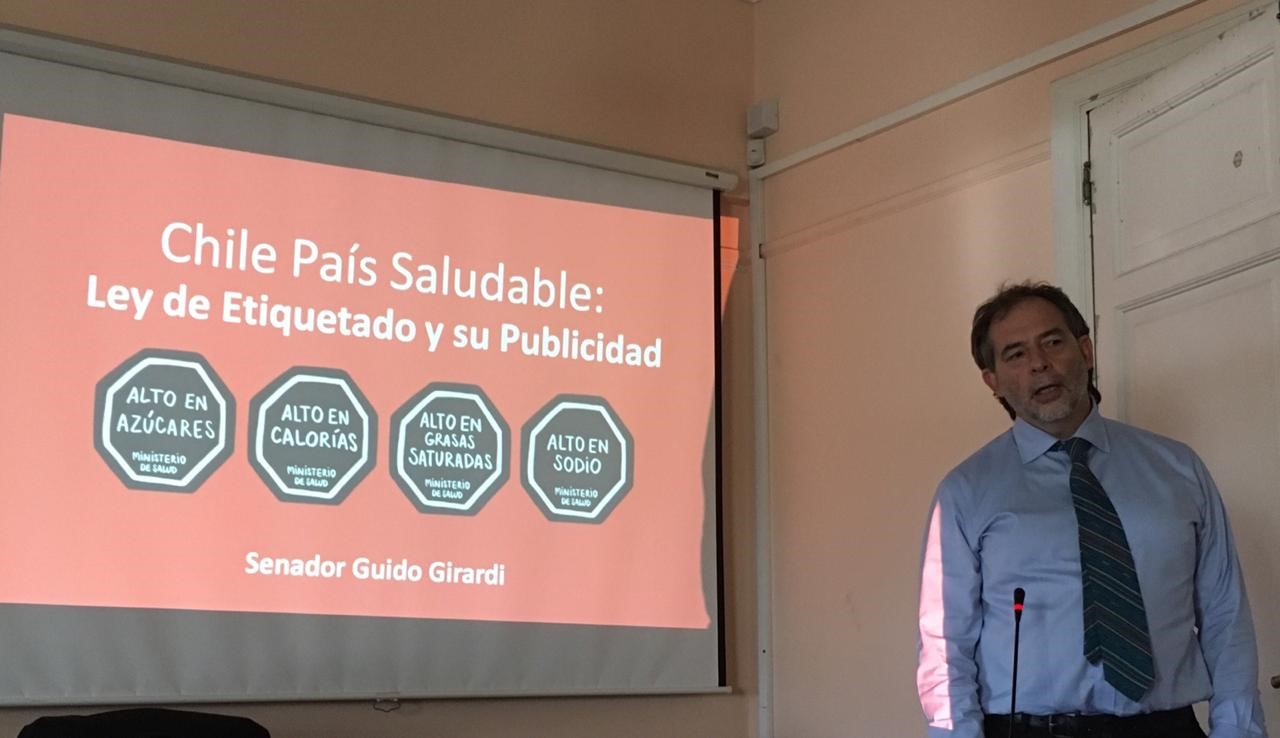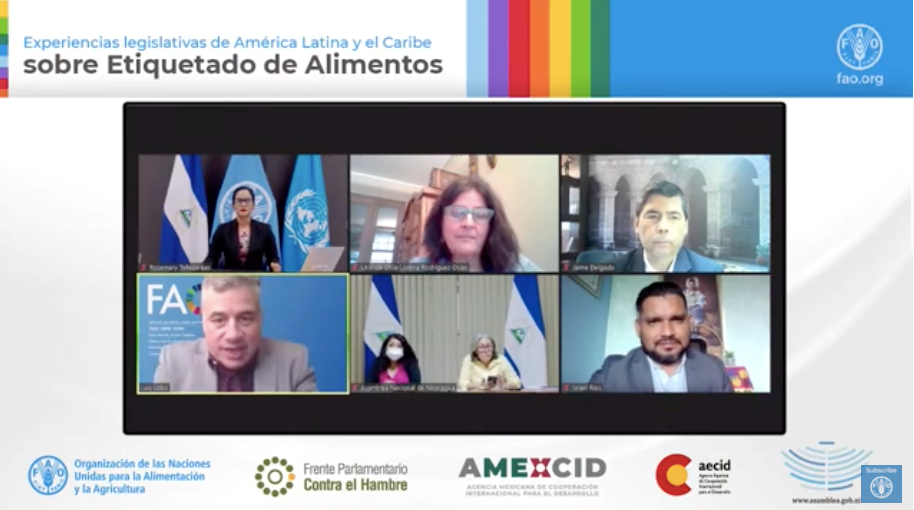 Generation of Laws on Food Labeling in Latin America and the Caribbean
Improving national legislation for food labeling to better inform consumers through South-South cooperation
Generation of Laws on Food Labeling in Latin America and the Caribbean
Improving national legislation for food labeling to better inform consumers through South-South cooperation

Challenges
According to the Food and Agriculture Organization of the United Nations (FAO) Food and Nutrition Security Outlook 2021, one in four adults in Latin America and the Caribbean suffers from obesity. In all countries in the region, the figures for food insecurity, obesity and overweight are higher for women than men. The number of overweight boys and girls under five years of age has increased in the last 20 years. In 2020, the prevalence was 7.5 percent, 2 percentage points above the world average.
If these trends continue, the region will not achieve the goal of SDG 2 that by 2030 statistics on overweight boys and girls under 5 years of age remains below three percent. Overweight and obesity have important economic, social and health repercussions for countries as they cause a reduction in productivity and an increase in disability and premature mortality, among other problems.
Towards a Solution
The programme for the Generation of Laws on Food Labeling in Latin America and the Caribbean supports countries to generate labeling laws that allow consumers to be better informed, promoting healthier food consumption and reducing malnutrition in all its forms in the region.
The programme is executed by the Parliamentary Front against Hunger (PFH) in Latin America and the Caribbean This is a plural network of legislators committed to achieving SDG2 in 21 countries in the region. PFH in Latin America and the Caribbean receives permanent support from the Food and Agriculture Organization of the United Nations (FAO), through the Hunger-Free Latin America and the Caribbean Initiative (financed by the Spanish Agency for International Development Cooperation (AECID)), and the "Mesoamerica without Hunger AMEXCID-FAO" programme, financed the Mexican Agency for International Development Cooperation (AMEXCID).
The Generation of Laws on Food Labeling in Latin America and the Caribbean programme addresses SDG2, in particular, target 2.2 (by 2030, end all forms of malnutrition) and SDG3, in particular, target 3.4 (reduce by one-third premature mortality from non-communicable diseases through prevention and treatment).
The work methodology is based on an exchange of experiences, through meetings and seminars, of national chapters of PFH, with the support of FAO and the Spanish and Mexican cooperation agencies. Exchange of experiences and dialogue has been promoted, articulating and disseminating the evidence and good practices of countries that have already carried out these policies. This has included regional, sub-regional and national political dialogue and parliamentary discussions of food labeling laws. PFH and FAO have sought to systematize these exchanges and the available evidence through publications that have been made available to the countries. The most recent of these publications (soon to be released) is a guidance note on "Nutrition labeling on the front of the container in Latin America and the Caribbean."
Since 2016, labeling has been a point of discussion in all the political spaces and meetings of PFH in Latin America and the Caribbean, and at least twice a year in their regional forum and in their annual planning meeting. Follow-up and technical assistance provided helped raise awareness in the parliamentary world. After legislation was approved in the first adoption country, Chile, in 2017, this experience was shared in subsequent meetings of PFH in countries throughout the region, which allowed PFH to respond in a concerted manner to some productive sectors that have resisted the advance of food labeling policies.
Several countries in the region now have food labeling laws, such as Chile, Colombia, Ecuador, Mexico, Peru, Argentina and Uruguay (Presidential Decree). Costa Rica, Dominican Republic, Guatemala, Honduras, Panama and Paraguay are working on bills on the matter. At the regional level, the Latin America and the Caribbean Parliament (PARLATINO) approved the Framework Law for Latin America on the regulation of advertising and promotions of food and non-alcoholic beverages aimed at children and teenagers and the Model Law on the Labeling of Processed and Ultra-processed Food Products for Consumer Human Rights and Health Protection that is in the process of being updated.
One of the most innovative elements of this good practice has been the permanent work of parliamentarians from different countries providing knowledge and experiences, but also working together with academia, especially through an alliance between the PFH and the Right to Food Observatory, an academic network of 90 universities throughout the region that has included food labeling policies within its Annual Call for Research on the Human Right to Adequate Food. The process has also involved civil society, consumer associations and other stakeholders interested in the topic.
Thanks to this successful policy work, more countries have joined and benefit from the experience of others, constantly improving this type of legislation and increasing the consumption of healthier products. In Chile, the first country in the region to pass this type of legislation, a study by the University of Chile, Diego Portales University and the University of North Carolina shows that between 2015 and 2017 the consumption of sugary drinks decreased by 23.7 percent and purchases of bottled water, diet beverages and fruit juices with no added sugar increased by 5 percent.
The greatest impact of this good practice is the scaling up of food labeling laws throughout the region, a process that continues to develop. Its sustainability is assured as the efforts of PFH are expected to continue and regional agreements have been strengthened, for example, the Parliamentary and Ibero-American Pact for Food Security with Gender Equality (which FPH is promoting).
To continue replicating this good practice in the region of food labeling policies and promotion of responsible consumption and production to reduce malnutrition in all its forms, it is necessary to deepen political commitment at the highest levels, to continue the cooperation of PFH with FAO, AMEXCID and AECID and to support more technical assistance and facilitate continued South-South cooperation among Latin American and Caribbean countries.
Contact Information
Countries involved
Supported by
Implementing Entities
Project Status
Project Period
URL of the practice
Primary SDG
Primary SDG Targets
Secondary SDGs
Secondary SDG Targets
Similar Solutions
| NAME OF SOLUTION | Countries | SDG | Project Status | |
|---|---|---|---|---|
100% Online Electronic Apostille and Legalization Sharing Colombia’s effective e-government system with other countries in the region |
Argentina, Chile, Colombia, Costa Rica, Dominican Republic, Ecuador, Guatemala, Honduras, Mexico, Panama, Paraguay, Peru, Uruguay | 16 - Peace and Justice Strong Institutions | Completed | View Details |
Adapting Digital Payment to Initiate Rapid Response During Pandemic Bangladesh government disbursed cash aid to 5 million most vulnerable families through mobile financial service in order to minimize the financial impact during COVID 19 within the shortest period of time. |
Argentina, Chile, Colombia, Costa Rica, Dominican Republic, Ecuador, Guatemala, Honduras, Mexico, Panama, Paraguay, Peru, Uruguay | 03 - Good Health and Well-being 05 - Gender Equality | Completed | View Details |
Addressing Racial and Ethnicity-based Discrimination and Strengthening the Protection of Rural Afro-descendants UNFPA supports data disaggregation as a tool to fight racism and ethnic discrimination |
Argentina, Chile, Colombia, Costa Rica, Dominican Republic, Ecuador, Guatemala, Honduras, Mexico, Panama, Paraguay, Peru, Uruguay | 01 - No Poverty 02 - Zero Hunger 03 - Good Health and Well-being 05 - Gender Equality 06 - Clean Water and Sanitation 11 - Sustainable Cities and Communities 16 - Peace and Justice Strong Institutions | Ongoing | View Details |
Addressing the Philippine Dairy Sector Challenges Exchanging knowledge between Argentina and the Philippines to improve Philippine local dairy production |
Argentina, Chile, Colombia, Costa Rica, Dominican Republic, Ecuador, Guatemala, Honduras, Mexico, Panama, Paraguay, Peru, Uruguay | 08 - Decent Work and Economic Growth 17 - Partnerships for the Goals | Ongoing | View Details |
ADELANTE Triangular Cooperation European Union – Latin America and the Caribbean |
Argentina, Chile, Colombia, Costa Rica, Dominican Republic, Ecuador, Guatemala, Honduras, Mexico, Panama, Paraguay, Peru, Uruguay | 10 - Reduced Inequalities | Ongoing | View Details |


